Stephen Roney's Blog, page 162
January 30, 2022
Now Its Not Enough to have a Hispanic Snow White...
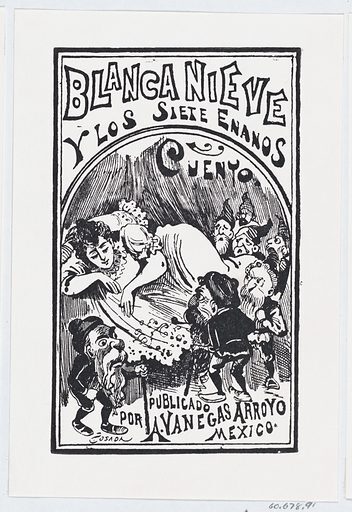
Dwarf actor Peter Dinklage is publicly criticizing Disney for planning a live-action remake of Snow White and the Seven Dwarfs, because to do so would somehow be discriminatory towards dwarfs.
Has he ever read the story? Disney might muck it up in any number of ways, but if they stick to Grimm, the dwarfs are the heroes of the piece.
Is any mention of dwarfs, complimentary or critical, discriminatory? Great job, Peter—throwing all dwarf actors on the dole and segregating dwarfs like lepers.
'Od's Blog: Catholic comments on the passing parade.
January 29, 2022
The Sky Father
Friend Xerxes persists in imagining the Christian God as a “bearded old man in the sky.”
This is not the Christian conception of God. It seems to be more common among atheists.
Xerxes complains that image “will get in the way of any other understandings of God that may come your way.”
If so, this bearded sky-father gets in the way of the Christian or Jewish conception of God, it is actually Satanic, an anti-Christ.
And I think Xerxes is right here. The image is sinister.
Christians conceive of God is as a man of thirty or so with Semitic features, not in the sky but in the Middle East. This is how he chose to reveal himself to us.
For Jews, any physical depiction of God is blasphemous—including as an old man in the sky. For this reason, any depiction of God the Father is prohibited in Orthodox iconography. In the West, until about the 13th century, he was only depicted as a giant hand or eye, as seen on the US dollar bill.
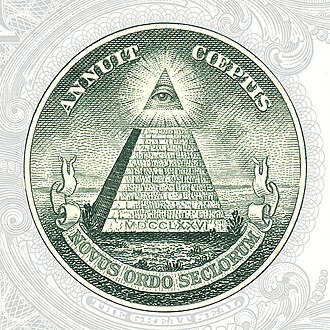 God the Father as depicted on the US dollar.
God the Father as depicted on the US dollar.
It is true that we do now see the image in some churches, although far less often than images of Jesus. This bearded sky father is famously featured in Michelangelo’s Sistine Chapel.
 Michelangelo's God the Creator
Michelangelo's God the CreatorSo where does he come from?
No doubt in part from Jesus’s reference to God as “father.” The father of a thirty-year old man would presumably look at least fifty.
But this is theologically nonsensical, since God the Father cannot age, and so cannot be any age in particular. Age implies change over time.
There is also one reference in the Book of Daniel, to a figure called the “Ancient of Days.”
“I watched until thrones were placed,
and one who was ancient of days sat.
His clothing was white as snow,
and the hair of his head like pure wool.
His throne was fiery flames.”
Is this a vision of God the Father? Apocalyptic literature is difficult to interpret. Different authorities have different interpretations. Orthodoxy says this figure is Jesus. Some say it is Jesus as cosmocrator, world ruler, at the end of time. Indeed, the description of Jesus in the Book of Revelations is similar:
“… someone like a son of man, dressed in a robe reaching down to his feet and with a golden sash around his chest. The hair on his head was white like wool, as white as snow, and his eyes were like blazing fire”
William Blake saw it as Satan, given hegemony over the earth.
“Then the devil led him up and showed him in an instant all the kingdoms of the world. And the devil said to him, ‘To you I will give their glory and all this authority; for it has been given over to me, and I give it to anyone I please.’”
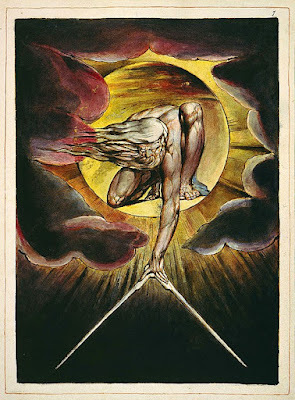 Blake's satanic "Ancient of Days," Urizen
Blake's satanic "Ancient of Days," UrizenBut if it is God the Father, or whoever it is, there is no definite warrant here for a beard, which is consistent in the iconography, and his throne in Daniel’s dream is on the shore of the sea, not in the sky.
The grey-bearded god sitting on a cloud hurling thunderbolts is, more plausibly, Zeus, the Greek “sky-god” and “father of the gods.”
 Zeus
Zeus
As a pagan god, he is, in Christian or Jewish terms, a demon.
This is not encouraging.
He also seems to have something in common with Santa Claus: both elderly men with long white beards. There is no reason, after all, to portray the real Santa Claus, Saint Nicholas, as an old man with a white beard. He might as well be shown at any age. In early representations, he has no white beard.
 St. Nicholas of Myrna
St. Nicholas of Myrna
There just does seem to be an urge to insert this figure of a bearded rich and authoritative old man as some kind of substitute for Jesus: as an image of the divine, and as a symbol for Christmas.
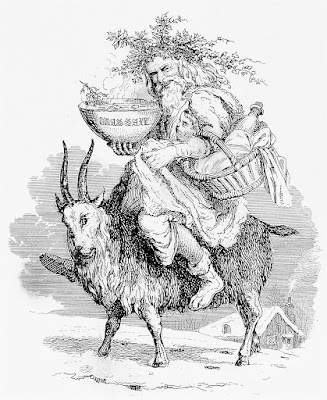 "Father Christmas"
"Father Christmas"
And I think, in practical terms, it is a barrier to many to knowing Christ. Especially for those who have had abusive parents, or bad experiences with authority, this image of God as a crowned ancestor has to be sinister.
I suspect bad parents, evildoers, and civil authorities of having snuck it in over time as an actual attempt to subvert and co-opt the Christian message.
Did they do it consciously and systematically? No need to assume so. The Devil works though a thousand, a million, little impulses, through our unreflective instincts.
'Od's Blog: Catholic comments on the passing parade.
Woke Ballet

Officials deny that Critical Race Theory is taught in the Ontario schools. On the other hand, one of my students had to cancel a writing class because her school required attendance at a special seminar on “racialization in ballet.” On a Friday evening.
Her brother informed me that only “non-white” students had to attend.
'Od's Blog: Catholic comments on the passing parade.
The Ottawa Convoy
 A "Canadian Gadsden flag"
A "Canadian Gadsden flag"
As I write, there is a large convoy of trucks converged on Ottawa to protest vaccine mandates. One hopes everything remains peaceful. The visible organizers seem form on this point. In principle, however, I think even peaceful public protests are anti-democratic, and socially irresponsible. Violence could always break out, innocent people are inconvenienced, and by their nature they tend to subvert the democratic process. They are mob rule.
However, this time, I am more disturbed by the Prime Minister’s response. He said the truckers were a “fringe minority” who “did not speak for Canadians,” and their views were “unacceptable.”
If violence breaks out, I’d say he is more responsible for it now than anyone.
It is not proper for the Prime Minister to declare the views of any Canadians seeking to petition their government “unacceptable.” It is beyond the pale, in a free society, to say that you will not listen to or discuss their concerns. It sounds more than a little like “let them eat cake.”
First Amendment of the US Constitution:
Congress shall make no law … abridging … the right of the people peaceably to assemble, and to petition the Government for a redress of grievances.
The essential demand of the truckers, as revealed on every sign and banner I see online, is to end vaccine mandates. They object to anyone being fired from their job for not being vaccinated.
It is true that some people associated with the convoy have made wilder demands. I saw a petition online directing their petition only to the Senate and Governor-General, implicitly declaring the House of Commons illegitimate. This nonsense is constitutionally impossible, undemocratic, and serves no purpose. But I feel sure that almost none of the actual participants in the convoy and protest feel committed to this idea. To cite it in relation to the larger protest looks to me like a red herring.
In fact, it is so obviously silly I suspect it is a false flag planted by government agents to discredit the protest.
Ending the vaccine mandates is a perfectly reasonable position. It has been clear for at least the past six months that there is no medical justification for them. We have known since then that the vaccinated could also spread the virus, and that herd immunity through vaccination was not an achievable goal. We also know, incidentally, that cloth masks do nothing against omicron. Accordingly, the government cannot appeal to the emergency to make what would otherwise be an infringement on human rights acceptable.
Moreover, it looks as though the emergency itself is over. Britain, Ireland, and Denmark have now ended restrictions. There is a strong medical argument that the best thing to do is for everyone to go out and catch Omicron as soon as possible after their booster shot. Their case should be quite mild, with omicron, they cannot avoid it for long anyway, and this is the only way to achieve long-term immunity. Best to catch it before the effects of the booster wear off. A doctor in Africa recently called omicron “the vaccine we could not make.”
In other words, it would look as though the government is working against the public interest at this point.
Worse, our supply chain is in tatters. My local grocery shelves are alarmingly bare. I overheard the manager explaining to another worried customer that all orders are behind by at least 72 hours, and getting worse. The government aying down mandates forcing truckers off the roads at just this point looks wildly irresponsible.
One wonders why they are doing it. One fears a totalitarian impulse in our “elites.”
'Od's Blog: Catholic comments on the passing parade.
January 26, 2022
The Moral Superiority of the Poor
 Ibn Khaldun
Ibn KhaldunThe great Ibn Khaldun theorized that, over time, all cultures become decadent. The ruling classes become complacent and selfish, and keep shaving more and more off the top of the economy, until the culture is no longer efficient. It then, sooner or later, cannot compete with a poorer culture nearby, the government of which is closer to the common people.
I think he is right—I think history reveals this pattern. It is why cultures rise and fall. And the modern West is at such a point of decadence. Who is the less bureaucratic, more egalitarian, more ascetic culture ready to take over?
Ibn Khaldun’s theory implies that the same thing will happen with individuals and families. Not that being rich is immoral, but because they become too accustomed to having their way, rich people are likely to grow less moral and more selfish than poor people. Narcissism, or as the Greeks more properly called it, hubris, is a disease of the rich and powerful.
The New Testament, especially Luke, agrees, and makes the same point repeatedly. It is easier for a camel to pass through the eye of a needle than for a rich person to enter the kingdom of heaven.
This seems to tally as well with my own experience. Most often, poor people are nicer than rich people.
The matter is obscured by the influence of Calvinism on our culture, so that we often imagine, contrary to the gospel, that material wealth is a sign of heaven’s favour. And that a prominent and rich family is a “good” family.
'Od's Blog: Catholic comments on the passing parade.
January 25, 2022
Why Ukraine? Why Now?
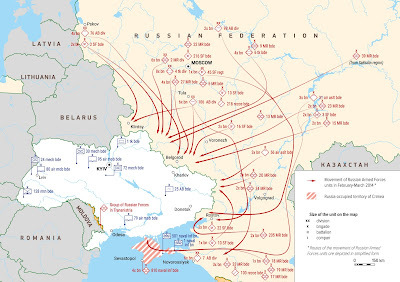
Why is Russia just now amassing troops on its border with Ukraine? There seems to have been no precipitating event, no trigger. And why at this time of year? Normally nobody launches military operations in winter, in a land where winters are severe. Winter favours the defense.
Which raises the suspicion that something is going on behind the scenes.
Why now? To begin with, because Biden looks weak, indecisive, muddled and unpopular. Not to mention, possibly bought. Pulling out of Afghanistan did not send a message of resolve.
Both Russia and China may be calculating that at this moment, America’s response, divided, leaderless, and exhausted by COVID, will be weakened. This window of opportunity might not last. Moreover, Xi’s or Putin’s power might not last. China looks economically shaky. In internal factional fighting, Xi might need some dramatic act to save his presidency, due to be extended or ended at the fall party congress. Putin may feel he needs dramatic action to quell possible unrest after Kazakhistan.
So this may be planned as a one-two punch. First Russia goes in. This leaves the US with a Hobson’s choice. If they commit heavily to the Ukraine, they may strip themselves of resources needed later to help Taiwan. Fighting Russia and China simultaneously looks beyond America’s ability or resolve, in its present weakened state.
Why right now, in winter? That looks like the most disturbing sign. If China is going to invade Taiwan, they have a narrow window, based on the monsoon seasons, to do it in May to July, or else in October. Monsoons famously defeated two planned Chinese invasions of Japan under the Qin Dynasty.
May to July is obviously the better window.
The Russian actions seem coordinated to fit this timetable.
And it all looks like the kind of deep strategy for which both Russia and China are traditionally known.
'Od's Blog: Catholic comments on the passing parade.
January 23, 2022
On Choosing a Religion
 Jesus as the Good Shapherd
Jesus as the Good Shapherd
Here’s another objection to becoming a practicing Christian from my 1982 notebook:
Objection: How is one to choose among the various religions? If God exists and is merciful, or even just, how can he permit the existence of a thousand false religions and only one true one? And then leave us with no clear basis on which to distinguish one from the other? And then say that anyone who makes the wrong choice is damned to hell?
To which I respond:
Religions differ far less than this supposes. They agree on most things. It is therefore reasonable to assume that a firm commitment to any religious path is sufficient, eliminating the problem. I hold that this is necessarily so, given these premises. God would not allow the persistence of a faith that did not lead to heaven if practiced in good faith. The New Testament itself testifies to the continuing validity, for example, of Judaism.
Monotheism is not tolerant of polytheism, it is true, and vice versa. The problem with polytheism is the “in good faith” part. Monotheism is ethical; polytheism is not. It does not believe in objective morality.
So why did God allow polytheism to persist? He does not, as a historical fact, as soon as a clear monotheistic alternative appears in any society.
Most religions do not believe that anyone who does not follow them will end in hellfire. Only some Protestant groups do, and some Muslims. Buddhists or Hindus do not. Neither do Catholics. While they hold Christianity to be, of course, the completed truth, anyone who is not aware of this is not punished. So long as their ignorance of it is not their own fault—that is, so long as they have been sincerely seeking truth.
The phrase “no salvation outside the church” is often quoted. But its sense is ambiguous. For after all, what is “the church”?
John 10: 16: “I have other sheep that don’t belong to this fold. I must lead these also, and they’ll listen to my voice. So there will be one flock and one shepherd.”
He might well here be referring to non-Jews, gentiles, as not being members of the flock to which he is speaking. Or he might be speaking more generally, of any visible or formally constituted flock. The true church is the “communion of saints.” This is obviously not coterminous with the people in attendance at a mass, or with the college of bishops. It is the confraternity of those who seek the good, the true, and the beautiful.
And when Jesus says he is the gate through which such souls must enter, surely he means the Logos, the Way, the Truth, and the Light, not that souls pass though his physical body somehow crafted into a gate. That is, one enters heaven by seeking the true and the good and the beautiful, wherever this leads, and despite personal sacrifice.
That said, it is an important step to tie oneself to a particular spiritual discipline and a particular objective set of moral standards. Without this, it is too easy to rationalize everything to your own advantage, and make yourself God. This, perhaps, is the “communion” part of the “communion of saints.”
'Od's Blog: Catholic comments on the passing parade.
January 21, 2022
Preach It, Brother!
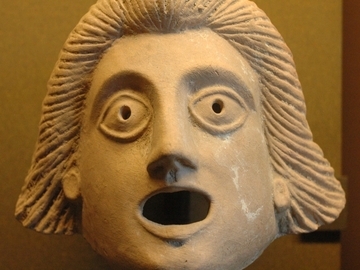
The audience for friend Xerxes’s column seems to be composed mostly of Protestant ministers. At least, those are the readers who comment. I was interested if not surprised to see that they seem universally to have approved of his last column, about putting a warning label on Christianity.
“Preach on, brother, preach on!”
“Your column should be nailed onto every religious building’s front door ―a new 95 Theses.”
“There is a good case that organized religion has done more harm than good.”
“After a lifetime in various forms of various ways to share spiritual health care, I have concluded that religions, and in particular Christianity, are toxins; we spend most of our lives trying at least to turn it from poison to a healing substance. Sometimes one wonders if rescuing the bible, defending God, examining the sins of scripture, finding original blessing and reclaiming Jesus has had any real effect. Maybe the smile message we should be about is ‘Don't swallow it!’”
It might come as a shock to many that the average Christian minister does not much believe in Christianity. Having spent a lot of time with Christian ministers in grad school, I am not surprised.
In a sense, too, they are right. “Organized religion” is toxic. The Bible itself, the New Testament, warns us so. But not in the sense they mean. Religious authorities are inclined to be hypocrites, Pharisees, playing a role they do not themselves believe in. That is the original meaning of “hypocrite”—an actor wearing a mask.
This is perhaps not a clear example. These ministers are not exactly concealing their true feelings: they say they want them nailed to the church door, and one imagines they express it in their counseling. But if they feel this way, why are they ministers? And isn’t calling themselves a Christian minister without endorsing Christianity itself a grievous deceit? Shouldn’t they, in conscience, refer the seeker on to someone else who does believe in it?
I remember explaining to Xerxes once why I had not become a Catholic priest: because I felt my faith was not strong enough. I was not sure I could commit to always believing all of Catholicism, into the indefinite future.
And his answer, at that time, was immediate: “so what?”
I see the same phenomenon in teachers. Our teachers do not actually believe in teaching anything. Instead, the class is supposed to “construct their own knowledge.” And the teacher is free to do the same.
To be honest, I just don’t understand this attitude. Maybe the explanation will come to me. In the meantime, I think it is important to notice it. I guess the moral is not to blindly trust the “experts” in any field.
'Od's Blog: Catholic comments on the passing parade.
Pulling No Punches.
Pretty amazing to listen to Fr. Altman busting loose. There is turmoil in the North American church these days.
'Od's Blog: Catholic comments on the passing parade.January 20, 2022
The Truth about Residential Schools
Great interview with Prof. Tom Flanagan on the Indian residential schools.
A couple of key points:\
1. Contrary to popular belief, Indian children were not forced to attend residential schools.
2. Contrary to popular belief, there is no evidence of any mass graves.



